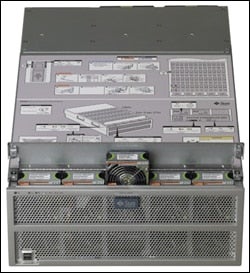Sun Microsystems this week launched a new appliance designed to help telecommunications companies protect their customer data. The Sun Secure Data Retrieval Server (SDRS) includes a Sun Fire X4500, a special server that serves data and stores up to 24 terabytes in 7 inches of rack space, and Live Archive software from CopperEye that helps […]


Sun Microsystems this week launched a new appliance designed to help telecommunications companies protect their customer data.
The Sun Secure Data Retrieval Server (SDRS) includes a Sun Fire X4500, a special server that serves data and stores up to 24 terabytes in 7 inches of rack space, and Live Archive software from CopperEye that helps securely retain data and preserve the business processes surrounding that data.
SDRS, the latest among a raft of data protection servers that includes IBM’s DR550, EMC’S Centera and HDS’ Hitachi Content Archiving Platform, comes at a time when data breaches are on the rise, leaving businesses susceptible to penalties for failing to preserve information integrity.
 |
| Sun SDRS Source: Sun |
While storage vendors typically create machines to help businesses address Sarbanes-Oxley and HIPAA protocols for preserving information, Sun said the SDRS is geared to help telcos meet the EU Data Retention Directive requirements for capturing and storing large volumes of compliance data, such as call detail records.
This is why Sun is targeting the SRDS at telcos, which typically need to manage billions of customer transactions and preserve billions of bytes of computer data on not only their customers, but their corporate business processes too.
With the performance power of the Sun Fire X4500 and the Live Archive technology, Sun argues that SRDS is better quipped than traditional storage arrays, databases and data warehousing facilities to handle data telcos create.
Specifically, Sun said SRDS can target specific records and retrieve them from billions of rows of structured data in seconds, compared to the minutes or hours competing products might take.
The machines can also provide direct access to source data and include options to seal generated disclosures to requesting authorities. What this does is ensure the integrity of data beyond the telco’s environment to address legal and civil liberty concerns around the directive.
Sun said in a statement that it is tracking the European Telecommunications Standards Institute standards for remote data query and hand over to ensure that SDRS will meet future requirements.
Article courtesy of InternetNews.com

Enterprise Storage Forum offers practical information on data storage and protection from several different perspectives: hardware, software, on-premises services and cloud services. It also includes storage security and deep looks into various storage technologies, including object storage and modern parallel file systems. ESF is an ideal website for enterprise storage admins, CTOs and storage architects to reference in order to stay informed about the latest products, services and trends in the storage industry.
Property of TechnologyAdvice. © 2026 TechnologyAdvice. All Rights Reserved
Advertiser Disclosure: Some of the products that appear on this site are from companies from which TechnologyAdvice receives compensation. This compensation may impact how and where products appear on this site including, for example, the order in which they appear. TechnologyAdvice does not include all companies or all types of products available in the marketplace.